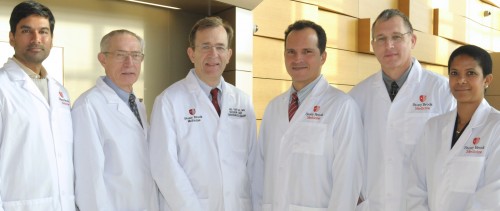From Undocumented Immigrant to the Top of His Field and Model of the American Dream
Harold A. Fernandez, MD, joined our faculty in 2012 as professor of surgery and deputy chief of the Cardiothoracic Surgery Division. He serves as co-director of Stony Brook University Heart Institute. He and co-director James R. Taylor Jr., MD, came to us together with the goal of transforming our robust cardiothoracic surgical program into a regional center of excellence, incorporating the newest and most innovative cardiac surgical techniques.
Dr. Fernandez's life story is uniquely inspiring. He came to the United States at age 13 as an undocumented immigrant from Colombia, and within ten years received his bachelor's of science degree in molecular biology from Princeton University, graduating magna cum laude.
Dr. Fernandez earned his medical degree from Harvard Medical School (he was a National Merit Scholar there), followed by a residency in general surgery and a fellowship in cardiothoracic surgery at NYU Medical Center. He joined St. Francis Hospital in Roslyn, NY, in 2001, working closely with Dr. Taylor for the next 11 years before they both came to Stony Brook in 2012.
Dr. Fernandez is the author of a memoir entitled Undocumented: My Journey to Princeton and Harvard and Life as a Heart Surgeon, and has received national publicity for his story as an immigrant who has risen to the height of his profession (see article in New York Times).
So far in his career as a surgeon, Dr. Fernandez has performed over 5,000 heart procedures. He also operates to treat thoracic conditions not involving the heart, contributing to our thoracic surgery service.
Q: Why did you select your field?
A: As a child in Colombia, the doctors who made house calls to care for my grandmothers influenced me. Their ability to heal, and the respect they had in the community, made a lasting impression. I also liked working with my hands, fixing bicycles, putting things together, that kind of thing, which is helpful if you want to be a surgeon. One of the appealing things about cardiac surgery is that it's very technical. It is also a very dramatic field in that you can see the results of your work clearly and immediately, and that fascinates me.
"Being able to fix things with my hands — bringing relief to and extending the lives of
people suffering from heart conditions — is what drew me to cardiac surgery."
Q: Why choose to work at Stony Brook? What is the opportunity here?
A: The opportunity to continue to work with Dr. James Taylor was important to me. Teaching medical students and surgical residents and being part of different research teams added an extra dimension. The opportunities to grow the program and grow professionally at Stony Brook were, and are, tremendous. The administration has been very supportive and on the same page in terms of creating a top-notch program.
Q: What is the most rewarding aspect of your job?
A: Being able to fix things with my hands — bringing relief to and extending the lives of people suffering from heart conditions — is what drew me to cardiac surgery in the first place and still appeals to me today.
Q: What breakthrough would you most like to make?
A: To me, one of the most important developments is the ability to make heart surgery gentler and less invasive, and to be able to offer these techniques to a wider range of patients, including older and sicker patients, so they have better results. I'd also like to combine our clinical work with some of the basic and translational research going on here at the university. The Heart Institute is positioned well to do both.
"To me, one of the most important developments is the ability to make heart surgery gentler
and less invasive, and to be able to offer these techniques to a wider range of patients."
Q: What might your field look like in the year 2020?
A: I see more collaborative, team approaches to many of the procedures we perform, and greater use of technology and research — in particular, some of the robotic technologies. In addition, I believe our growing ability to manipulate tissues at the genetic level will contribute significantly to what we can do for patients.
Q: If you could send one message to the community about your field, what would it be?
A: At the end of the day, medicine is about people and about patients. No matter how much technology we may have, or how innovative our procedures may be, there is no substitute for compassion. That is one of the things we strive for at the Heart Institute: to use the most advanced technology and latest developments but use them in the most compassionate and caring way.
Q: Do you have a trait you are willing to share, as a window into your personality?
A: I like to spend my spare time with my kids. But an important issue to me personally is access to healthcare by economically disadvantaged populations. I devote a lot of time outside of the hospital reaching out to these communities, including Latin American communities, to talk about heart health. I visit churches and other groups, and also offer educational videos in Spanish.
| Dr. Fernandez is a leader of our Cardiothoracic Surgery Division that comprises six board-certified surgeons, each of whom contributes to the excellence and innovation of the Heart Institute: (left to right) Drs. Sandeep Gupta, Frank S. Seifert, James R. Taylor Jr., Harold A. Fernandez, Thomas V. Bilfinger, and Allison J. McLarty. Together, they perform over 600 adult cardiac procedures and 200 adult thoracic procedures annually. |
For consultations/appointments with our cardiothoracic surgeons (links to profiles), please call 631-444-1820.

